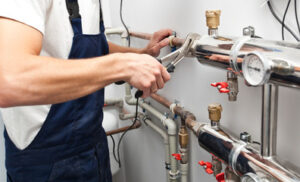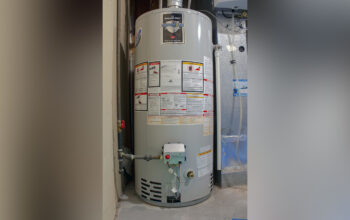Plumbers install, repair, and maintain pipes and fixtures that facilitate water, gas, and waste disposal in residential and commercial settings. They interpret blueprints and building codes to plan plumbing installations, and they collaborate with architects and construction teams to ensure that plumbing systems integrate seamlessly into new building projects. Contact Plumber Rosenberg TX for professional help.
A typical job involves inspecting accessible water and drain pipes, checking for leaks, testing faucets and showerheads for proper flow rates, and flushing toilets to check for drainage obstructions. Plumbers also test water pressure by attaching a gauge to an exterior hose spigot; normal pressure should fall within 40-80 psi.
Residential plumbing services focus on maintaining water systems and appliances within personal dwellings like houses, apartments, and condominiums. This includes repairing or replacing toilets, showers, faucets, garbage disposals, and water heaters. It also involves inspecting sewage lines and drains for problems like leaks and blockages. In some cases, a residential plumber may be called to install new pipes for home expansion projects.
When choosing a residential plumber, be sure to find one who is licensed and insured. This will ensure that they have the skills and knowledge to complete your plumbing work safely and correctly. It’s also important to choose a plumber who offers warranties on their work and parts. This shows that they stand behind their work and are confident in their abilities.
Another difference between commercial and residential plumbing is that commercial plumbing usually deals with larger-scale systems than those found in homes. This can include industrial equipment like boilers and site sewer lines, as well as complex pipe networks that supply multiple floors of a building with water. Residential plumbers often deal with smaller, more straightforward issues like clogged drains and broken toilets.
Regardless of the type of plumbing project, a residential plumber should always be prepared to provide timely and effective solutions. This is especially important for emergency situations, when you’ll need to call for assistance as quickly as possible.
Additionally, a residential plumber should be able to communicate clearly with their clients and other contractors. This will help avoid any confusion or misunderstandings during the job, which can lead to costly mistakes and delays. For example, if a homeowner is planning a kitchen renovation, the plumber should be able to coordinate with the electricians and carpenters to ensure that all the different elements of the plumbing system are compatible and functioning properly. Lastly, residential plumbers should be willing to work on weekends and after-hours when needed to meet urgent needs. This can help them accommodate customers’ schedules and avoid disrupting their daily routines.
Commercial
Plumbers who work in commercial settings have a wider range of responsibilities than their residential counterparts. They may install and repair plumbing systems in offices, schools, shopping centers, hospitals, and industrial facilities. These large-scale buildings require specialized plumbing equipment to handle a higher volume of water usage than residential properties. Additionally, they must be able to follow building plans and design specifications when installing plumbing in new constructions.
When dealing with commercial clients, plumbers must be able to respond quickly to any problems they encounter. This is because the buildings they service are typically used by a lot of people on a daily basis, so any problems with the plumbing system can cause significant disruptions to business operations.
In addition to responding quickly to emergency situations, commercial plumbers also maintain and inspect plumbing systems to ensure they are functioning correctly. This includes testing backflow preventers in restaurants and flushing sediment out of water heaters to improve efficiency. Moreover, commercial plumbers may be responsible for installing and maintaining gas line connections to appliances such as stoves and ovens.
One of the main differences between residential and commercial plumbing is the size of the pipes that are used. Commercial plumbing uses larger pipes than residential pipes, which can be more difficult to work with. Furthermore, commercial plumbing often involves working in high-rise buildings with tight spaces and security concerns.
While most plumbing problems encountered in residential properties are relatively minor, commercial clients often have more complex issues that need to be resolved immediately. For example, a burst pipe in an office building can disrupt productivity and lead to costly downtime for businesses. Therefore, it’s important for commercial plumbers to have the right tools and knowledge to resolve these issues quickly.
Plumbers who work in commercial buildings have to be familiar with a wide variety of building codes and regulations. This includes understanding how to properly install and connect piping to heating and cooling systems, fire suppression systems, and other important components. In addition, they must be able to understand and comply with health and sanitation laws when installing or repairing plumbing fixtures in restaurants and other food services.
Collaboration
From unclogging toilets to installing water heaters, plumbers use their skills to improve people’s quality of life. The work is not always glamorous, but it is important and satisfying when it is done well. Plumbers also work with a variety of other professionals to ensure that plumbing systems are integrated seamlessly into building projects. This work can include collaborating with architects and construction teams to design plumbing systems for new buildings and ensure that all requirements are met.
Another important aspect of plumbing is testing the water flow rate through fixtures like sinks, showers, and bathtubs. This ensures that there is adequate water supply for usage and can detect problems such as clogs or insufficient flow rates. Plumbers often provide emergency services as well, responding to calls for assistance with burst pipes or other urgent matters. Soft skills such as communication and teamwork are essential for this profession, as is the ability to problem-solve. This is a career that provides ongoing challenges and opportunities to grow and learn. It is an excellent choice for those who enjoy working with their hands and making a difference in people’s lives.

